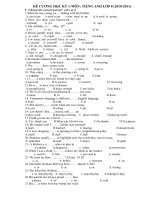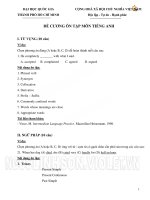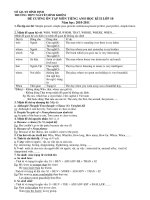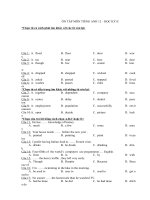ĐỀ CƯƠNG ôn tập môn TIẾNG ANH 8 học kì II
Bạn đang xem bản rút gọn của tài liệu. Xem và tải ngay bản đầy đủ của tài liệu tại đây (153.16 KB, 10 trang )
ĐỀ CƯƠNG ÔN TẬP MÔN TIẾNG ANH 8 HỌC KÌ II
A. STRUCTURES :
1 .The present perfect tense (thì hiện tại hoàn thành )
S+ have/ has +p.p (V-ed /V 3 ) +………
Dùng để diễn tả một hành động diễn ra ở quá khứ và còn kéo dài đến hiện tại
S+ Have /Has + p.p +O +since /for +time
-Diễn tả một hành động đã xảy ra rồi
S +Have /Has +already +p.p +O
-Diến tả một hành động chưa hoàn thành xong:
Have /Has +S +P.P +O ..yet?
2. The past progressive tense(Thì quá khứ tiếp diễn )
S +was /were + V-ing +O
-Diễn tả một hành động đang diễn ra tại một thời điểm xác định ở quá khứ
( at 8 o’clock last night / at this time last Sunday )
- Diễn tả hai hành động xảy ra song song cùng một lúc :
While +S + Were /Was +V-ing +O, S + Were /Was +V-ing +O
-Hai hành động diễn ra ở quá khứ. Một hành động đang diễn ra thì có một hành động
khác chen vào .Hành động đang diễn ra chia thì qktd , hành động chen vào chia thì qkđ .
- While +S+ Were /Was +V-ing +O, S +V(qkd ) +O
- When +S +V (qkd )+ O ,S+V(qktd ) +O.
3.The present progressive tense (Thì hiện tại tiếp diễn )
S+ is /are am +always+ V-ing +O
-Dùng với từ “always “ diễn tả lời phàn nàn.
*Drill :Chia thì đúng cho các câu sau :
1 .It started to rain while I (walk) to school .
2 .She (not /finish) her homework yet .
3 Nga and Lan (do) the homework at 8 o’clock last night.
4 .Oh dear ! They always (go ) to class late.
5. When Mr Tuan (arrive ) home ,his children (watch ) a film on TV.
6 .What you (do) at this time last Sunday ?
-We ( collect ) waste paper for recycling.
7 . He (be ) in Viet Nam for two weeks .
8 .Yesterday Ba (ask ) me to go to the station with him . but I ( not/ want ) to leave the
house because I (wait )for a call.
9 .I (already /see ) that film.
10 .Mrs. Quyen (do ) shopping while Mr. Thanh ( attend ) a business meeting.
11. Last night when we came to visit him, he (do) an experiment on the upstairs.
12. Mr. Ba (not go) out since he has bought a new color television.
13. They often go to school by bike, but yesterday they (walk) to school.
14. We can't (go) out because it is raining now.
4/PASSIVE VOICE ( Câu bị động )
a/ Simple present tense
1
(A)
S + V 1 /V –es /s + O + (M )
(P )
S + is /am are + p.p(V-ed / V3)+ (M ) +( by + O)
b/ Simple past tense :
(A )
S+ V-ed /V2 + O + ( M )
(P )
S +was /were + p.p (V-ed / V3) + ( M ) + (by + O)
c / Modal verbs : Will / Shall /Could /Must/ Should
(A )
S + Modal verb +V1 + O + (M )
(P )
S + Modal verb +be +p.p + ( M ) + (by + O)
d / Present perfect tense :
(A)
S + have /has +p.p
+O +(M)
(P)
S + have / has + been + p.p + (M ) + (by + O)
*Drill : Chuyển những câu sau sang bị động :
1.My father bought this house two years ago
2 .We have done these exercises carefully.
3 .People recycle car tires to make pipes.
4. The workers will build a new school in my town.
5 .Franz Gruber wrote the Christmas carol in the 19th century
6. People can reuse milk bottles for thirty times .
7. People speak English in the world .
8 .The boy has broken the classroom window.
9 .I got his letter this morning.
10. They make these cars in Japan
5.Indirect speech (Câu gián tiếp)
Cách chuyển đổi từ câu trực tiếp sang câu gián tiếp:
a. Thay đổi về thì
Is/am/are
was/ were
V1/ V-es/s
V2/V-ed
Don’t /doesn’t
Didn’t
Will
Would
Can
Could
Must
Had to
b. Thay đổi đại từ : Phụ thuộc vào chủ ngữ của mệnh đề chính
c. Thay đổi từ chỉ nơi chốn và thời gian
This
That
Here
There
Now
Then
Today
That day
Tomorrow
The next day/ the following day
Cách chuyển câu hỏi Yes /No sang câu gián tiếp
S+ V + O + If /Whether + S + V
Said
asked /wanted to know
*Drill : Chuyển những câu sau sang câu gián tiếp
1. Mai said “We are going to have an English –speaking club “
2
2. “I will come here tomorrow “ said Tim
3. She aksed me “Do you know him? “
4. My friend told me “ I can repair the bike myself “
5. My friend said “ after Tet every thing is expensive “
6. “ Is Phong Nha Cave far from HaNoi , Lan ? “ Peter aksed
7. The teacher said to Nam “ You must study harder in English “
8. “ Do many tourists visit Ha Long Bay every year , Nga ? “ Mary aksed
9. Nam said “ My sister likes cooking “
10. My mother said “ I want our house to look clean and nice at Tet “
6 /Present participle and past participle used as Adjectives
a. Present participle : V-ing (active meaning )
đang
b. Past participle : V –ed /V3 (passive meaning )
bị ,được
*Drill : kết hợp những cặp câu sau dùng hiện tại phân từ hoặc quá khứ phân từ
1.The man is standing near the window . He is Nam
2 .A car was made in Japan . It was very expensive
3 .The film was shown on TV last night .It won the first prize in the film festival last
year
4. A man is working in the garden .He is my grand father
5. A window was broken in the storm last night .It has been repaired
7/ The forms of verbs :
S + want /aks /tell / get / advice / start /begin /decide /try /allow + To –infinitive
( V1)
S +V + (O) + wh-question+ to-V1
S +will /shall /can /should /could /ought to /must /might + bare-infinitive (V1)
S + used to / have to / be going to + V1
S + be+ Adj + to –infinitive(V1)
S+ be+ adj +enough +for+ O + To-V1
Too +adj
S + enjoy like/love/dislike/hate /finish /mind /spend + V –ing
8/ Compound –Noun :
Noun + V –ing (adj )
A /an + N + V-ing
+
N
Compound -noun
Eg :rice-cooking , fire – making , car –making
*Drill : Viết lại các câu sau sử dụng tính từ kép :
1. It is a farm which raises chickens
2. Viet Nam is a country which exports rice
3. It is a contest in which participants have to cook rice
4. This is a machine which is used to wash clothes
5. It is a festival in which people have their cocks fight against each other
3
9 / Requests ,offers and promises
a. Request : Can /Could you + V1………
?
Will /Would you please + V1 ……..?
Sure / OK /All right /
I’m sorry I can’t /I’m afraid not
Would /Do you mind + V –ing…………….?
Do you mind if I + V1 …………………………..?
Would you mind if I + V (simple past ) …………?
No, I don’t mind /No, of course not /Not at all /Please do
I ‘d rather you didn’t /I’d prefer you didn’t
b. Offers :
Would you like + to – V1…..?
Shall I /Can I + V1 ……….?
Will you /Won’t you + V1………?
Yes, please /That would be nice /No , thank you
c. Promises : I promise I will + V1
I won’t + V1
I hope so /Good / I’m glad /Don’t forge
B. EXERCISES
I. Choose the word whose underlined part is pronounced differently from that of the
rest.
1. A. whole
B. when
C. where
D. while
2. A. notice
B. socket
C. enroll
D. mobile.
3. A. engineer
B. exercise
C. Experiment D. exhibition.
4. A. comment
B. equipment
C. improvement D. development
5. A. bean
B. teammate
C. Speaker
D. overhead
II. Choose the correct answer to complete each sentence.
6.
Would you mind if I ………………a photo.
a. take
b. took
c. taking
d. to take
7.
Mount Rush more can be……………from more than 100 kilometers
a. see
b. saw
c. seen
d. been seen
8. My friend is always………………in class.
a. talked
b. talking
c. talks
d. told
9. she asked me ………………a driving licence.
a. if I have
b. whether I have
c. if I had d. whether I have had
10. Nylon......................in the 1930's
A. invented
B. is invented C. was invented D. has been invented
11. The librarian asked us ........................ so much noise
A. don't make
B. not make C. not making D. not to make
12. would you mind......................... off the TV, please?
A. return
B. returning
C. returns
D. returned
13. It’s dangerous …………….in the river.
A.swim
B.to swim
C.swimming
D.swam
4
14.
……….you mind if I smoke ?
A.could
B.Don’t
C.Do
15. When will the project be ………….……..?.
A. to start
B.start
C.started
16. Please let me _______you with this heavy bag.
A. help
B. to help
D.would
D.starting
C. helping
D. helps
ĐỀ CƯƠNG ÔN TẬP MÔN TIẾNG ANH 9 HỌC KÌ II
I. UNIT 6:
1. Adverb of manner (Trạng từ chỉ thể cách,mức độ )
* Cách thành lập :Tính từ ( Adj) + ly = Adv of manner( Trạng từ chỉ thể cách)
eg: slow ->
slowly
happy ->
hapily.
Good ->
well.
Ngoại lệ : hard, late, fast, early vừa là tính từ vừa là trạng từ
* Vị trí : - Đứng sau tân ngữ của câu. ( Mrs. Nga speaks English
quite well)
- Đứng sau động từ thường. ( The old man walked slowly
to the park)
- Thường đứng ở cuối câu. ( She sings beautifully)
2. Adverbs clauses of reason ( mệnh đề trạng ngữ chỉ lý do) Since /As /
Because : Bởi vì .
Eg: Ba is tired because / since / as he stayed up late watching TV.
3. Conditional sentences- Type 1 ( Câu điều kiện loại 1)
* Cấu trúc :
If clause ( mệnh đề if)
Main clause ( mệnh đề chính)
(+) If + S ( I / you / we / they) + V-infinitive
(+) S + will + V-inf…
If + S( he/ she/ it / tên) + Vs /Ves …
* Thêm “ es” vào sau nếu động từ đó tận cùng là o,
x,ch, sh,ss (ví dụ: go, watch, wash, ..)
(-) If + S (I / you / we / they) + don’t + V- infinitive …
(-) S + won’t + V-inf…
If + S( he/ she/ it / tên) + doesn’t+ V-infinitive.
* Usage : Diễn tả một điều kiện có thể xảy ra ở hiện tại hoặc tương lai.
Eg : If we go on littering, the environment will become seriously
polluted.
II. UNIT 7:
1. Connectives ( Từ nối ):Viết nghĩa tiếng Việt của những từ nối sau:
And :và
But: nhưng
Because / Since/As :Bởi vì
Or: hay là, hoặc là
5
So :vì thế, vì vậy
However :Tuy nhiên
2. Phrasal verbs ( Động từ kép )
Turn on: mở ( ti vi, đài)
Turn off: tắt
Look for: tìm kiếm
Look after:trông coi, chăm sóc
Listen to: nghe
Look up:tra cứu
Go on :tiếp tục
Talk about: nói về
3. Suggestions ( câu đề nghị)
Suggestion
1. I suggest + V-ing
2. What about + V-ing…?
3. How about + V-ing…?
4. Shall we + V-inf ..?
5. Let’s + V-inf…
6. I think we should + V-inf…
7. Why don’t we + V-inf …?
8. I suggest that + S + should + V-inf
Therefore:vì vậy mà
Dream about:mơ về
Response
1. OK
2. That’s a good idea
3. All right.
4. No. I don’t want to.
5. I prefer to…
6. Let’s…
III. UNIT 8:
1. Relative clauses ( mệnh đề quan hệ / mệnh đề tính ngữ) ):
Mệnh đề quan hệ xác định là mệnh đề dùng để xác định danh từ hoặc đại từ
mà người nói muốn nhấn mạnh đến.
Eg: The teacher who teaches us maths is Mrs. Quynh Hoa.
2. Relative pronouns ( Đại từ quan hệ )
Who : là đại từ quan hệ dùng để thay thế cho danh từ hoặc đại từ chỉ người,
làm chủ ngữ trong mệnh đề quan hệ.
Eg : Tom can compose songs. Tom can sing Western folk songs very well .
Tom who can sing Western folk songs very well can compose songs.
Whom: là đại từ quan hệ dùng để thay thế cho danh từ hoặc đại từ chỉ
người, làm tân ngữ trong mệnh đề quan hệ
Which : là đại từ quan hệ dùng để thay thế cho danh từ hoặc đại từ chỉ vật ,
làm chủ ngữ và làm tân ngữ trong mệnh đề quan hệ.
That la đại từ quan hệ dùng để thay thế cho who, whom, which trong
mệnh đề quan hệ xác định
6
Where ( nơi mà ) : thay thế cho cụm từ chỉ nơi chốn. Cụm từ chỉ nơi chốn
gồm các giới từ : in, on, …+ danh từ ( in the school, in the village , in the
house, there … )
When ( khi mà, thời gianmà) : thay thế cho cụm từ chỉ thời gian ( on that
day, in that month, then …)
Eg : This watch is a gift. The watch was given to me by my aunt on my 14
th
birthday.
This watch is a gift which was given to me by my aunt on my 14 th
birthday.
Whose ( của người mà / của vật mà): thay thế cho các tính từ sở hữu ( his /
her / their / name’s ) + danh từ.
3. Adverb clauses of concession ( mệnh đề trạng ngữ chỉ sự đối lập )
Mệnh đề trạng ngữ chỉ sự đối lập thường được bắt đầu bằng các từ though /
although / even though ( mặc dù /Dù cho)
Eg: We went to Ha Noi to watch the parade although (though /even
though ) we live in Nam Dinh.
IV. UNIT 9:
1. Relative pronouns : who,that, which.( Đại từ quan hệ : Who,that, which)
That là đại từ quan hệ dùng để thay thế cho Who, whom và which nếu danh từ
đi trước nó là some /any + N, the most / the + adj (est ) + Adj hoặc danh từ chỉ cả
người và vật.
Eg: The men and animals that you saw on TV were from China.
2. Non – defining relative clauses ( mệnh đề quan hệ không xác định) : là loại
mệnh đề dùng để cung cấp thêm thông tin cho danh từ hoặc đại từ đi trước nó, nó
có thể được bỏ đi mà không ảnh hưởng gì đến nghĩa của câu. Mệnh đề quan hệ này
thường đứng giữa hai dấu phẩy.
Eg: Vietnam, which is in South –east Asia , exports rice
V. UNIT 10.
1. Modals :May /Might : động từ đặc biệt : May /Might : Có thể. Có lẽ.
May / might + Vinfinitive
=> Dùng để: - dự đoán sự vật, sự việc. ( It might be a meteor : Có thể đó là một
ngôi sao băng)
- nói về một khả năng . ( There might be water in Mars : Có khả
năng có nước trên sao Hỏa)
- xin phép ( May I go out ? : Thưa cô cho em ra ngoài)
2. Conditional sentences type 2 ( câu điều kiện loại 2)
If clause (mệnh đề If)
Main clause ( mệnh đề chính)
7
(+) If + S + VII, ed ( be -> were ) + … (+) S + would / could /should + V(-) To be: If + S + were not + …
inf…
ĐT thường : if + S + didn’t + V-inf (-) S+ (would / could /should) not + Vinf…
Dùng để nói về một sự việc, hành động không có thật hoặc không thể xảy ra ở
hiện tại .
Eg: If I were rich, I would travel around the world ( Nếu tôi giàu, tôi sẽ đi du lịch
khắp trái đất )
Exercises
I / Nối những câu sau với từ cho sẵn:
1. We could not get tickets. We queued for an hour. ( although)
2. Nancy felt hot in her coat.She took it off ( so)
3. The old man is my grandfather. He lives next door (who)
4. Intel computers are very good. They are made in India. ( which)
II/ Rewrite the following sentence:
1. Many tourists enjoy festivals in Vietnam.Tourists don’t understand
Vietnamese culture very much.
-> Though
2. I bought a new computer. It cost me a lot of money ( which)
3. I think it would be a good idea to take the train -> I suggest
4. I know some people.They live in London ( who)
III. Điền 1 giới từ thích hợp cho các câu sau :
1. I’m looking forward………………….hearing from you.
2. We were interested…………………….the program on TV last
night.
3. She prefers walking ……………..swimming
4. I look………………..my lost key everywhere but I can’t find it.
IV.Viết lại các câu sau theo gợi ý :
1. As a boy, I often flew a kite -> I used
2. What a pity I don’t know many friends -> I wish I
3. People grow rice in tropical countries -> Rice
4. “ Why do you want this job ?” -> My sister asked me
V/ Viết lại câu sau theo yêu cầu trong ngoặc
1. Ann is very friendly. She lives next door ( using who)
2. The postcard was from henry. It came this morning ( using which)
3. It was abeautiful day. We decided to go out ( using so)
4. Shall we go to the cinema tonight ? ( begin with What about)
5. I lose the key, so I can not get into the house ( beginning with if )
8
VI/ Viết lại những câu sau sao cho nghĩa giống như câu đã cho
1. I think it would be a good idea to spend the summer vacation in Da Lat.
I suggest
2. You can avoid waiting by booking the table in advance.
If
3. Because of the bad weather, we didn’t go on a picnic.
-> Because
4. Her book is widely read. It is well- written ( relative pronoun)
5. “ Do you read this information, Lan ?” Ba asked
-> Ba asked
VII/ Dùng And, but, so, because để nối những câu sau :
1. I like mary very much, ………………….I don’t like her brother.
2. I can’t go out tonight…………………I haven’t enough money.
3. She went to the theater last night…………………….she had a wonderful
time
4. I enjoy learning English………………….I enjoy learning math. Too.
VIII/ a/ Viết lại câu thứ 2 sao cho nghĩa không đổi theo từ gợi ý :
1. It’s going to rain, so we can’t go camping. -> If
2. I think it would be a good idea to take the train -> I suggest
3. Going fishing with friends is fun -> It’s
b/ Nối cặp câu sau thành 1 câu sử dụng từ gợi ý trong ngoặc
1. I lost my bike. I bought it two years ago.( which)
2. I know the man. He lives in your neighborhood. ( who)
3. Nam always gets bad marks. He is very lazy ( so)
IX/ Supply the correct tense or form of the verb in brackets :
1. My brother came home late last night. He ( not get up)…………………yet.
2. The teacher told his students ( not make )……………………..such noise in
class.
3. I passed the ( write)………………..exam but I fail the oral test.
4. We have to stop ( work )…………………………because of the noise.
X/ Rewrite the following sentences as directed in parentheses :
1. We don’t know much about tennis rules.We like to play it ( however)
2. Smoking is not good for our health. Many people like them. (even though)
3. We always love our form teacher. She is very kind ( using relative pronoun)
4. My best friend gave me a lovely cat ( change into passive voice)
5. He loves humorous stories. He doesn’t like ghost stories. ( but)
XI/ Rewrite these sentences as directed in brackets:
9
1. Lan is my classmate.She lives near my grandparent’s house ( combine in
one sentence using a relative pronoun)
2. It rained heavily.My father went to work on time ( combine into one
sentence using “ although”)
3. We don’t have enough money, so we can’t buy that house ( If)
4. The trousers are too small for me. I bought them yesterday (combine in one
sentence using a relative pronoun)
5. We hadn’t seen Lis for a long time so we didn’t recognize her (combine in
one sentence using “because”)
6. She isn’t English. She speaks English perfectly (combine in one sentence
using Although)
7. The boy is Jane’s brother. He sat beside you at the party last night
(combine in one sentence using a relative pronoun)
8. We don’t have enough money to go on holiday. ( if we )
9. We / would / the flight / afraid / were / you / miss/ that ( write sentence in
the correct order)
10.Let’s go abroad for our holiday this year. ( Why)
III. Chọn từ (ứng với A, hoặc B,C,D ) mà phần gạch chân có cách phát âm
khác với những từ còn lại :
11. A. sight
B. mineral
C. might
D. device
12. A. flood
B. moon
C. typhoon
D. balloon
13. A. recent
B. resource
C. replace
D. regularly
14. A. amount
B. achieve
C. dynamite
D. deforestation
15. A. complain
B. conserve
C. cover
D. environment
16. A. walked
B. filled
C. died
D. played
17. A. treasure
B. sewage
C. save
D. campus
18. A. spoil
B. folk
C. float
D. violent
19. A. conservation B. flow
C. post
D. ocean
20. A. persuade
B. prevent
C. impressive
D. secondhand
21. A. smell
B. fence
C. pesticide
D. recycle
22. A. instead
B. beach
C. leaf
D. clean
23. A. quarter
B. category
C. crack
d. draft
24. A. crack
B. nuclear
C. faucet
D. car
25. A. chopstick
B. scheme
C. each
D. chair
26. A. bulb
B. consumer
C. plumber
D. luxury.
27. A. model
B. solid
C. solar
D. profitable
10
28. A. cheap
29. A. bath
30. A. chopstick
31. A. celebration
32. A. slavery
B. nuclear
B. worth
B. crack
B. considerate
B. last
C. heat
C. them
C. scenery
C. decorate
C. guest
11
D. clean
D. thing
D. receiver
D. Easter
D. towards









